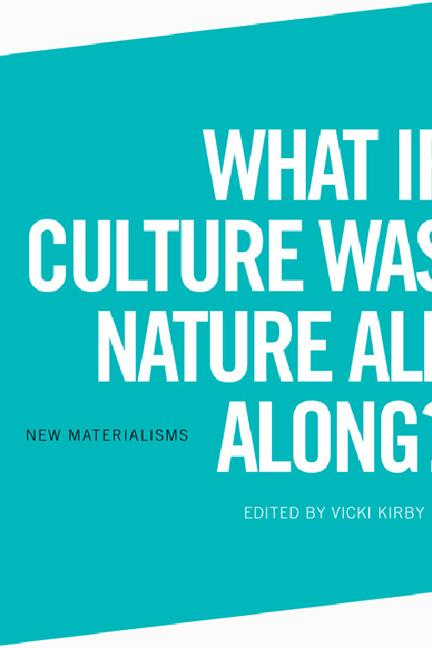Book contents
- Frontmatter
- Contents
- Acknowledgements
- Foreword
- 1 Matter out of Place: ‘New Materialism’ in Review
- 2 Method Matters: The Ethics of Exclusion
- 3 Sensory Substitution: The Plasticity of the Eye/I
- 4 Allergy as the Puzzle of Causality
- 5 Pregnant Men: Paternal Postnatal Depression and a Culture of Hormones
- 6 Material Culture: Epigenetics and the Molecularisation of the Social
- 7 Racialised Visual Encounters
- 8 Microbiology as Sociology: The Strange Sociality of Slime
- 9 Nature Represents Itself: Bibliophilia in a Changing Climate
- 10 Climate Change, Socially Synchronised: Are We Really Running out of Time?
- 11 A Sociality of Death: Towards a New Materialist Politics and Ethics of Life Itself
- Notes on Contributors
- Index
9 - Nature Represents Itself: Bibliophilia in a Changing Climate
Published online by Cambridge University Press: 22 December 2017
- Frontmatter
- Contents
- Acknowledgements
- Foreword
- 1 Matter out of Place: ‘New Materialism’ in Review
- 2 Method Matters: The Ethics of Exclusion
- 3 Sensory Substitution: The Plasticity of the Eye/I
- 4 Allergy as the Puzzle of Causality
- 5 Pregnant Men: Paternal Postnatal Depression and a Culture of Hormones
- 6 Material Culture: Epigenetics and the Molecularisation of the Social
- 7 Racialised Visual Encounters
- 8 Microbiology as Sociology: The Strange Sociality of Slime
- 9 Nature Represents Itself: Bibliophilia in a Changing Climate
- 10 Climate Change, Socially Synchronised: Are We Really Running out of Time?
- 11 A Sociality of Death: Towards a New Materialist Politics and Ethics of Life Itself
- Notes on Contributors
- Index
Summary
The tongues of the glaciers are receding, the voices of our rivers are being dammed and clogged with toxic debris. Who are the scribes writing about our waters and where are the libraries that store their moist stories?
(Irland 2011)In Antarctica as Cultural Critique (2012), Elena Glasberg avers that ‘ice is not to be written and not to be read. It is not to be captured within pages. It is not a book; certainly, it is not like a book’ (xiii). Glasberg's aim here is to challenge the capture enacted by historicity and narrative, instead pointing to ice as ‘inexpressible supplement to the historical process’ (xiv–xv). Yet if ice resists being read ‘like a book’, what are we to make of critical-creative interventions into the ecological imaginary such as Basia Irland's ice books, set adrift in order to reseed riparian habitats – ‘read’ by the currents and their congeries of multispecies life? Or Roni Horn's Library of Water (2013), where, in the Icelandic town of Stykkisholmur, Horn fills twenty-four floor-to-ceiling columns, each with water from a significant glacier in Iceland – and names it after a book repository? We might also puzzle over Glasberg's own photography that accompanies her claims of resistance to ice-as-book, where a cutaway of ice-and-earth striations appears, in the words of a glaciologist, ‘like a book open on its spine’ (Glasberg 2012: xiii). Here, Glasberg recasts her position, provocatively claiming that her own book is not a ‘book on ice’, but rather ‘a book of ice that instead opens horizontally’ (xiii).
Reading Glasberg (that is to say, with her book in hand), we might surmise that there are books and reading ‘proper’, and then there is a different sort of book – written of/with/by the ice, in another mode of material articulation. This tentative distinction brings to mind Katherine Yusoff's musings in Bipolar, a collection of textual archives on ice cores, polar knowledge, and climate change. ‘From the beginning’, writes Yusoff,
I had this image in my mind of putting an ice core next to the central core of books in the British Library. This image of two cores – one cultural and one biophysical – set a lot of questions in motion about the possibilities of these two types of environmental knowledges. (Yusoff 2009: 34)
- Type
- Chapter
- Information
- What if Culture was Nature all Along? , pp. 179 - 198Publisher: Edinburgh University PressPrint publication year: 2017



